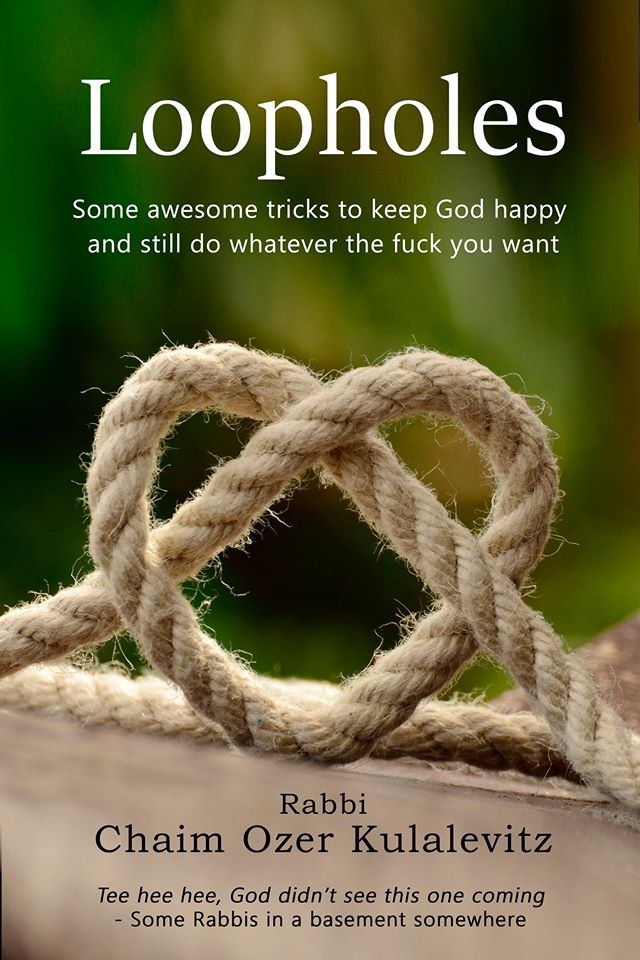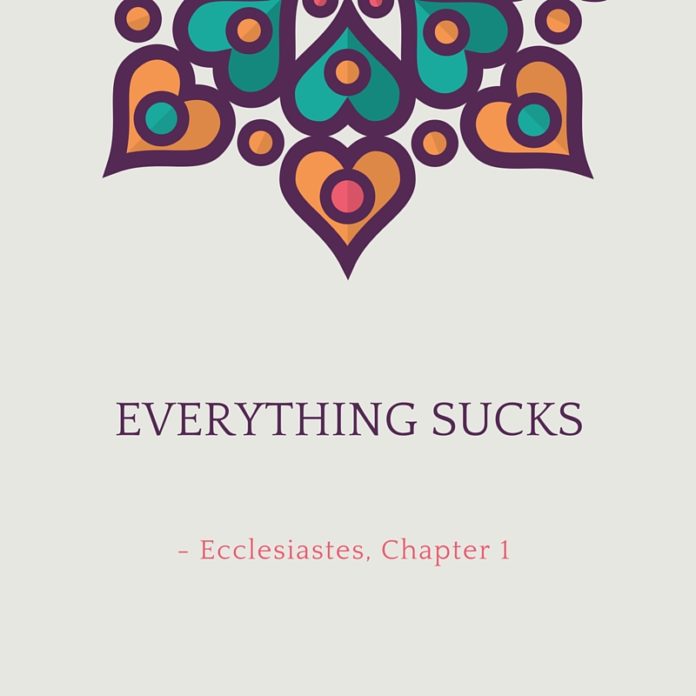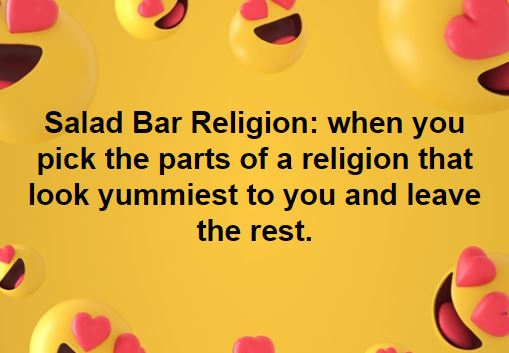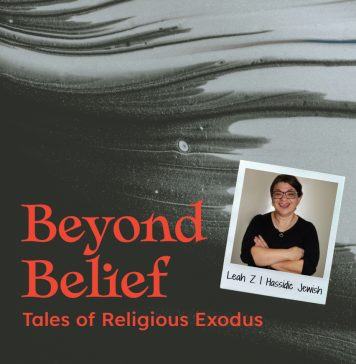Loopholes
Good news: if you have money, even being A Good Jew in The Eyes of God™ is easier.
Instead of slaving away getting your house clean for Passover, just sell your house to a non-Jew (awesome loophole, Rabbis!) and go to the nearest tropical resort you can find. There, you can enjoy a five star experience that is Approved in The Eyes of God and Man while being entertained by the most inspiring Rabbis money can buy. Wouldn’t want any of that inspiration running dry, would you now.
Because sometimes, Judaism is all about the letter of the law.
Do I own any leavened bread today? No, because somehow one sorry Arab bought all of the city’s bread at the same time.
Is this the live hair of a married woman you are seeing? (the horror!) No, I cut it off and made it into a wig, mothefucker.
Am I carrying outside the zone on Shabbat? Nope, because see those telephone poles?
Did I just make an interest payment on a loan? No, because of that sign on that wall.
And other times, it’s all about the spirit.
Can you have all of your lights and TV and coffee maker automated on Shabbat? Nope, because you’d be missing the point.
Can you fuck a married woman using a condom, since condoms are like, totally spilling seed? Nope, because dude, you’re hitting the point.
Can a woman have a slit in her dress if it doesn’t show any prohibited skin? C’mon! It’s all about whether she’s arousing men, not what part of the body is actually showing.
When does the distinction get made? No one knows for sure. Or, more accurately, “the Rabbis are in disagreement on the subject”. In reality? This is just another expression of social norms – some things just made it in, others are still taboo.
Stop pretending this is part of some higher order and admit you’re just a bunch of fucking people trying to make sense out of life by arbitrarily following a certain set of rules – rules that still evolve, just in a different way than anyone else would call normal.
You claim to be resistant to change, preserving the ways of tradition. In reality you look nothing like Jews, or Judaism, or Israel looked like in the past – you just evolve at your own glacial pace, with your own stupid justifications.
You’re at least as dumb as everybody else.
After a certain Rabbi I knew all too well came out publicly as having had an affair with a married woman, while also reassuring people that there was no “actual transgression” involved due to the absence of penis-in-vagina penetration (can’t remember the exact bullshit language), I reposed this book cover with the following divrey chizuk:
Raboisay. In light of recent events, rachmana litzlan, it’s worth bringing up a recent point I’ve made so eloquently and humbly in the past. As we all know, sometimes it’s the most obvious points that need chizuk, especially if you’re delusional.
Religion is used as a supposed framework for morality:
“Who are we to trust ourselves? To know what’s right?
We need guidance! We need direction! We need clarification!
How many grams of cheese can fall into your cholent before you become a morally repugnant person? How many days old does a fetus need to be for it to be called a murderous abortion? Tell us, oh Torah written when we still thought the sun revolves around us. You know best.
In fact, the opposite is true:
When you look to a book to define what is wrong and right, it’s much easier to engage in the mental acrobatics we all do to justify your behaviors. It’s one thing to rationalize your shit, we all do that. It’s another to have God’s book on your side backing up your hair-splitting insights.
Let’s all take it upon ourselves to be mischazek in speaking as yeshivishly as possible and also not being total fucking idiots about what we KNOW is wrong or right, bullshit religious justifications notwithstanding.
V’hameivin yovin.
No Bad Questions
The kiruv world prides itself in its open-mindedness.
“Ask us anything! We will change our views in a heartbeat if you convince us! Sure you can ask about sex, and no, we don’t use a hole in the sheet, we’re super progressive!”
But ask yourself, have any of the really difficult questions that plague you (and you know what they are), been replied to with one or more of the following bullshit textbook answers?
• God knows what’s best for us
• Mashiach will come and we’ll all have clarity
• There’s a Kabbalistic reason for that
• Don’t judge Judaism by the Jews who practice it
• We have a rich tradition of handing down bullshit verbatim from one generation to the next, so it must all be true
• God is true. God wrote a book. Deal with it.
• “You could never lie about a million people being around a mountain if it didn’t actually happen.”
• “The Rabbis knew what was best for us.”
• “People were way smarter back then.” See also: “Our generation sucks.”
• “That’s a very good question you’ve asked! Many smart people have asked that too!”
• Not to be confused with its condescending inverse: “You’re not the first person to ask that question, you know…”
• “We can’t use fallible human logic to understand such profound ideas.”
• Which is the exact opposite of: “Those are just guidelines, you’ve still got to use your head to figure out what’s right”
• “You can’t use your heart, use your mind!” But also: “You can’t use your mind, use your heart!”
• “The truth is, both opinions are correct! Both are the word of a living God!”
And so your questions have gone unanswered, because those weren’t answers.
Those were justifications.
My Rabbi is Bigger
If I had a dollar for every time someone told me this, I’d have enough money to start my own religion. Or at least my own congregation. Same difference, really.
Everyone seems to have some magical elusive Judaism that I’m missing out on.
“Your Judaism is not like my Judaism.”
“You should meet Rabbi Feiglebaum. He’s great, and he’s not even judgmental!”
“There’s this great book/shiur/podcast I’m reading, you should check it out.”
Here’s my question. How did I, with all my 14 years of Torah study, miss out on such a core part of this supposed Judaism? If it’s such an important insight/attitude/approach, where the fuck has it been this whole time?
God certainly knew exactly how to make it clear just how fucked you’d be if you crossed him. But somehow he, in his Infinite Wisdom TM, neglected to mention that amazing Kabbalistic insight until it was discovered in the 16th century and can now only be accessed in a dinky weekly class on a side street in nachlaot you’ve been going to?
Furthermore. Not one person has been able to articulate to me what this elusively amazing Judaism actually is. It’s always this exasperated sigh, “Oh dear, if only you’d had my amazing 3rd grade teacher you’d know the truth.”
“Tsk tsk, seems you’re just a bit too late to be open to hearing the amazing seminar that is mostly based off Buddhism but has a bit of some contemporary Rabbi’s ideas thrown in.”
If you’ve got some amazing insight, say it. I’d like to believe I can respectfully hear it. So far all I’ve got is some amorphous references to the Nirvana behind the paywall, some Scientology level I don’t have access to because I haven’t paid enough.
Musings on Religion
Recently, in light of recent events, a friend of mine asked to have a call with me, which was quite awesome, and to record it, which was cool.
We ended up discussing a whole bunch of stuff – why I write this stuff on Facebook and what it’s been like for me. Following your intuition vs. your mind. Self actualization vs. self awareness. My attitude towards self discipline.
The emotional liberation of dropping religion. My relationship with money and frugality – and how I see financial literacy in my family and society. On having children, being a father, and the guilt of parenting.
My views on marriage – in Judaism and in general. On loneliness, happiness, and dropping out of rabbinical school.
Since I was only able to record my side, it came out as an almost hour long monologue. It’s like a podcast with no interviewer and no defined subject. Dream come true, right?
So if you’ve been following my posts but also want to hear my sultry voice (I was fighting a cold, so even sexier than normal), or if your idea of a good time is listening to me talk for an hour, this recording is for you.
Kiruv Oxymorons for the Ages
It took me a long time to realize this, but the kiruv system pulls some really sophisticated mindfucks while trying to convince people about the “truth” of religion.
They will basically play both sides of an idea – contradicting themselves but making some convincing arguments in the process. Until you realize that they just got done using the exact opposite logic to make a different point a few minutes ago.
Here are some of my favorites:
Science is dumb and inaccurate, and is influenced by popular agendas”
Also,
This famous scientist agrees with our point, so it must be true”
Christians and Muslims are dumb and mislead, everything they say is bullshit”
Also,
Even Christians and Muslims agree about the veracity of the Torah, so it must be true
You can’t just follow the mindless masses. A bunch of zeros can’t add up to 1.
Also,
Wanna know what the best-selling book of all time is? The Bible.
Look at how immoral everybody else is. Reading the news makes our eyes cry and our heart ache. It makes you That’s why you need Torah as a moral guide.
Also,
Oh, that terrible law that’s in the Torah? That’s actually moral because God said so.
Look how happy the Torah makes us. You too can be happy if only you’d follow it!
Also,
Oh, that unhappy person keeping the Torah? That law that makes you unhappy? The Torah is not supposed to make you happy. It’s just the truth.
Don’t use emotions to arrive at ‘truth’; use the calculating logic of your mind.
Also,
Now that you’ve arrived at truth, please suspend your own logic and just do what you’re told.
Other nation’s folklore is bullshit, just a bunch fairy tales spun around campfires.
Also,
The epic of Gilgamesh proves Noah’s flood happened, and they actually found hieroglyphics in Egypt that allude to the plagues!
What other religion speaks so openly about the flaws of its leaders?
Also,
Well, actually, the Talmud explains that King David’s sin really wasn’t so bad.
The Torah holds truth for every generation.
Also,
Our generation is very distant from truth and is therefore misguided.
Got your own favorite oxymoron? Post it in the comments. Who knows, maybe you’ll even make someone frum in the process.
Deception
This one is a kiruv special, not aimed at Judaism as a whole.
“Did you know the Matrix is a metaphor?
That Groundhogs Day teaches us a valuable lesson?
That the lead singer for Maroon 5 is Jewish? (and hawt, mmm!)
What Gossip Girl can teach you about having a great Jewish marriage!
If that’s not a reason to drop your life and become so religious you never partake of any of those things anymore, I don’t know what is.”
Real shocker. the outside world also has concepts of struggle, self development, and the human condition. Let’s appropriate all of it as Jewish invention, Jewish influence, Jewish symbolism! Not to mention how cool and relatable it makes us look!
The irony of this Kiruv trick is that the Rabbi’s own children are often not exposed to this “filth”. Shabbat guests are tolerated for behaviors and methods of dress that family members would never be allowed to partake in. Rabbis will switch from their black and white snowsuits to more acceptable polo shirts and baseball caps when they move to campus. What are you, a fucking spy?
Even people within the rest of the Orthodox community have called out the Kiruv movement for this hypocrisy, for which I commend them. The Kiruv response is usually something along the lines of “when you’re saving a person’s (spiritual) life from a burning house, your clothes might get singed”.
I have seen those closest to me employ these tactics. Hiring non-Jews to advocate for Israel. Getting Bill Clinton to endorse Aish Hatorah. Whatever it takes to create the persona you need, the Kiruv world will make it happen, and keep their own ludicrous opinions to themselves long enough to keep the deception alive.



















































